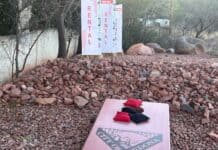While giving her final annual update as Sedona Chamber of Commerce’s president and CEO, Jennifer Wesselhoff often held back tears as she looked back on not just the previous year but the past two decades with the chamber.
The chamber’s normal annual meeting includes a breakfast for more than 100 invitees along with guest speakers at Poco Diablo Resort. But due to COVID-19 it was held virtually.
Wesselhoff, who has been with the chamber for 19 years and at the helm for 13 years, accepted a similar position in Park City, Utah. Her last day is Friday, Oct. 9.
“It makes my heart so full knowing that I have made a difference in this amazing community,” she said. “I’m certain the board, the team and new leadership will welcome the opportunity to evaluate and enrich the values that have led our organization for the last decade.
“We realize change is hard and I’m realizing that first-hand, but we know that in order to improve and grow, we must change and continually challenge ourselves to do better and to be better.”
She then focused on the past year, specifically the last eight months and the impact COVID-19 has had on everyone.
“When we met a year ago, none of us could have foreseen this historic devastation the coronavirus would bring to our businesses, our families and the entire nation,” Wesselhoff said.
She said as a result of a community effort and an economic recovery task force, many were able to keep their jobs during Arizona Gov. Doug Ducey’s stay-at-home suggestion while many businesses were able to keep their doors open. But she said some have not been so fortunate and have lost their jobs or businesses.
She said their goal was to keep businesses, residents and visitors informed over the last several months as to safety measures, how to apply for assistance and what was open and what was not.
“Through it all, you have supported each other and supported us with grace, courage and resolve.,” Wesselhoff said.
She said while Sedona is in a good position for recovery, the way people travel may be impacted for quite some time. They’re often seeking more of an off-the-beaten path experience where they can be outdoors.
“I can’t think of a better place than Sedona to experience those things,” she said, adding that people want to travel but health is a major concern.
Wesselhoff said the local economy is showing progress, which is reflected in collected sales tax data. An estimated 77% of those tax dollars come by way of visitors. The city was seeing record numbers in sales and bed taxes until COVID-19 hit — with most months up double digit percentages compared to the previous year.
As proof that things are better than expected June sales taxes were actually up in 2020 compared to 2019. Overall sales tax — despite the pandemic — was down 6% for Fiscal Year 2019-20. During the past fiscal year compared to the previous, retail had a 1% decrease while restaurants and bars were down 15%. Hotels and motels were down 13%, and amusement spending took a big hit at 30%.
Like sales taxes, bed taxes were also hitting record numbers prior to COVID- 19, with some months seeing a more than 20% increase compared to the same month the prior year. After COVID-19-related closures, the spring saw as much as a 90% decrease in hotel occupancy. Things bounced back in June as occupancy was nearly the same as in 2019.
Michelle Conway, the chamber’s director of marketing and interim president and CEO, said the chamber put all marketing on hold from March through September. But that will soon change.
“Now, the time is right,” she said. “We’re gearing up to deploy an aggressive campaign that centers largely on digital marketing that targets and engages an affluent audience.”
The plan is to offer a five-month marketing campaign, which begins in mid-October to promote the normally slow winter.
During the fall campaign, the chamber will again be targeting Phoenix and Los Angeles, while new this year is San Diego.
“We target high-income households because it helps us to maintain the ‘less is more’ strategy,” Conway said. “Meaning, we don’t want the masses. What we do want are fewer people here who can afford to stay longer and spend more.”
